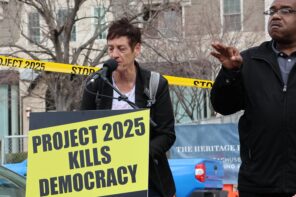The Religious Right is experiencing another, devastating Covid surge, especially in Southern states with Republican governors. Meanwhile, conservative state legislators are furiously passing laws against voting rights and the teaching of critical race theory, the new conservative Christian bogeyman. What appears to be a recent political focus on one theory of systemic racism actually echoes a long racist history to protect segregated Religious Right schools described in Randall Balmer’s concise, coherent, and compelling new book, Bad Faith: Race and the Rise of the Religious Right. [Read an excerpt here.]
In this slim 141-page volume Balmer details how mid-twentieth century white, male, evangelical Christian leaders in the South sought to protect their segregated religious schools from federal laws that mandated integration. They insisted that religious freedom allowed them to discriminate based on the argument that they accepted no federal funds (though, of course, they paid no taxes). The Republican Nixon administration decided to use the schools’ tax-exempt status to force them to integrate.
Bob Jones University lost its status, but the case took so long to get to the Supreme Court that the Carter administration and Democrats were blamed for the University’s loss. While schools like Falwell’s Liberty Baptist College (now Liberty University) caved and began to integrate to keep their 501(c)(3) status, it took the brilliant Republican strategist Paul Weyrich to persuade Falwell and other conservative evangelical leaders to adopt abortion as a wedge “moral” issue to rally a Religious Right voting base because a racist argument would be rejected as immoral by a majority of Americans. This new strategy required, for many, a flip-flop on their previous positions, which had largely been far more compassionate toward women. They had, after all, tended to view abortion solely as a Catholic issue; and since Catholics weren’t ‘saved’ they weren’t ‘real’ Christians.
Balmer’s treatment of the story of the evangelical abandonment of reproductive justice exposes the crass opportunism, bald-faced lies, and corruption of the racist charlatan preachers of the Religious Right in their own words. Balmer reveals layers of deception and double-think as the process of building their right-wing voting base on abortion politics evolved. Their facile lies about medicine and science, their profound sexism, their strange-bedfellows arrangement with Catholics on the Supreme Court, and their bogus “morality” created the template for the current anti-democratic politics of the die-hard evangelical Trump base.
We now see what the last half-century of the Religious Right pursuit of power has reaped as it’s being tested by the worst pandemic in a century. Their voter base rejects information from medical experts, refuses to mask or be vaccinated, turns to taking disinfectants and potentially dangerous drugs with no scientific support as cures for Covid, and, at its most extreme, is willing to attempt an insurrection to hold onto power.
Bad Faith is laser-focused on the political cost of America’s toxic originating sin of racism. The history it unfolds of duplicitous evangelical preachers is well worth reading and remembering as they trot out the next ‘moral’ issue to rally their voting base. For that history alone, this book is worth reading as a way to open more nuanced discussions across the hardened lines of abortion politics.
Ever the optimist Balmer hopes that the Religious Right might repent of its racist history and abortion politics.
Once evangelicals come to terms with the abortion myth and the racism baked into the Religious Right, I dare to hope that they might then reexamine other aspects of their political agenda… inordinately dictated by the fusion of the Religious Right with the far-right precincts of the Republican Party…. Jesus, after all, enjoined his followers to care for “the least of these,” and taking those words seriously could very well prompt a redirection of [single-issue] evangelical political energies…. Such a reconsideration might also provide an opening for rapprochement with black evangelicals and other evangelicals of color.
Given the history Balmer describes with concise clarity, his focus on racism on the Religious Right without attention to its intersection with sexism makes his hope for repentance and change ring hollow, partly because he too neatly bifurcates racism and abortion politics, which are more closely linked than many assume, and neglects the deep misogyny and paternalism still deeply infusing the Religious Right.
Religious Right leaders built their power with callous and arrogant disregard for women’s lives. They also supported a racist, sexist, unqualified demagogue for president who had no interest in religion or the Bible. Repentance is not in their playbook. With a court packed with conservative Catholics that might reverse Roe v. Wade, the Religious Right may no longer need abortion as a defining issue for its voters, as Bradley Onishi suggests. Recent attacks on critical race theory and voting rights indicate they’ve abandoned any hesitation about using racism to motivate their base.
Unlike Balmer, I do not believe accurate history will change the key players of the Religious Right and its voters. While I sympathize with his hope, I found myself cringing at his appeal to care for “the least of these,” an outdated paternalism of nineteenth-century social gospel movements. In the last half-century, as the Religious Right held on to an immoral past, theology and politics have moved toward liberation from oppression, economic and social justice, and the decolonization of Christianity.
Having built a meaning system desperate for power, the sociopathic Religious Right leadership has no capacity for moral injury—for experiencing devastation and tragedy as a challenge to the white male supremacy that is their meaning system and their god. They have demonstrated that they will use any means necessary to prop up white male supremacy. By not heeding the plague for the sake of political power, they have sacrificed their people for their tax exempt status and doomed them to the ravages of a global pandemic decimating their ranks. That consequence might be poetic justice for the Religious Right leadership, but it’s tragic for those who believe in and follow them.





